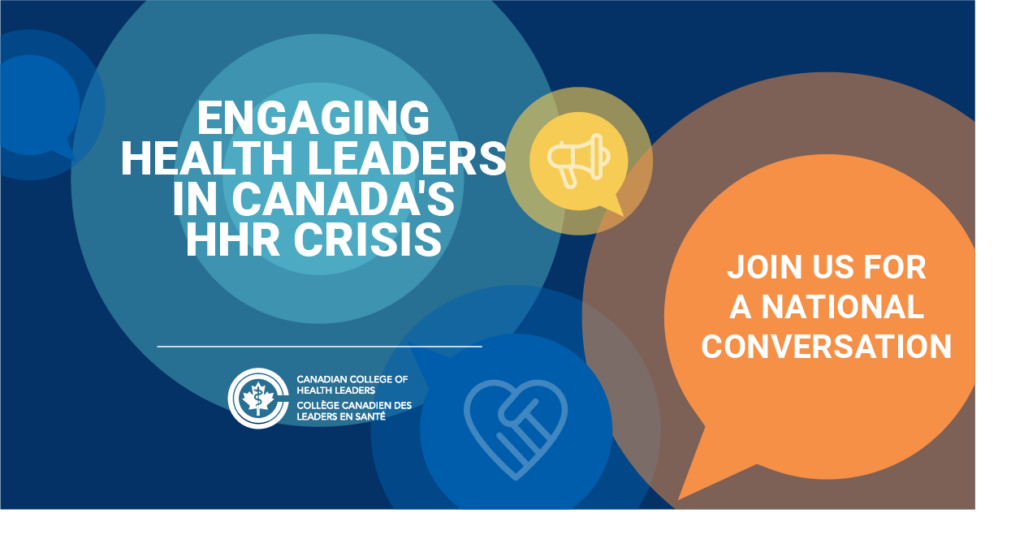La Conversation nationale du CCLS est une occasion pour les membres du CCLS de toutes les régions du pays d’en apprendre davantage sur une question prioritaire à laquelle sont confrontés les leaders en santé et de contribuer à faire progresser la réflexion en la matière dans le but de favoriser un leadership en santé efficace à l’intérieur et à l’extérieur de la communauté du CCLS. Nous souhaitons atteindre ce but en réunissant nos membres pour qu’ils participent à un dialogue éclairé par des experts sur un sujet particulier prioritaire auquel font face les soins de santé au Canada, en recueillant leurs avis sur les compétences en leadership requises pour s’attaquer à la question et en diffusant un résumé de la Conversation nationale au moyen des réseaux dans tout le Canada.
Le sujet de la conversation nationale de 2024 est Engager les leaders de la santé dans la crise des RHS au Canada, explorant le rôle que les leaders de la santé peuvent jouer pour conserver la main-d’œuvre actuelle des ressources humaines en santé (RHS) et se préparer à l’afflux d’une main-d’œuvre nouvelle et plus jeune, afin que le secteur de la santé le système soit durable et l’effectif des RHS soit engagé, responsabilisé et retenu. Vous pouvez en apprendre davantage sur le format de la Conversation nationale 2024 et ses conférenciers en consultant notre page dédiée aux Conversations nationales antérieures.
Consultez le résumé
Un livre blanc a été publié en anglais. Un résumé de ce document est disponible en français.
Télécharger le résumé (en français)
La liste de vérification
La liste de vérification qui vient d’être publiée offre une approche complète pour s’attaquer à ces défis, en mettant l’accent sur l’engagement et la communication, le recrutement et la rétention, la sécurité et le bien-être, la reconnaissance et l’appréciation, le soutien et le développement du personnel et les pratiques de leadership.
Document : Liste de vérification
Consult Sections of the White Paper
Les documents suivants sont disponibles en anglais seulement.
Topic Summary
The 2022 Health Human Resources Symposium brought attention to one of the most pressing issues in Canada’s healthcare system: the health human resources (HHR) crisis. With challenges such as a shrinking workforce, low retention rates, and worsening workplace conditions—compounded by the COVID-19 pandemic—the healthcare sector is under immense pressure. This topic summary outlines key discussions on how health leaders can play a pivotal role in retaining the current workforce and preparing for the future.
Outline
The 2024 National Conversation explores how Canadian healthcare systems are engaging, supporting, and retaining their workforce while preparing for future challenges. In part one, experts like Dr. Ivy Bourgeault, Deborah Gordon, Dr. Karima Velji and Dr. Michael Gardam discuss national strategies while part two, featuring leaders such as Kelly Kimens, Mike Nader, and Kathy MacNeil, focuses on organizational efforts to ensure workforce sustainability.
Part 1 – Executive Summary
The Executive Summary of Part One from the 2024 CCHL National Conversation presents key insights from expert panelists on shaping a supportive and sustainable healthcare workforce in Canada. The discussion covers strategies for long-term workforce engagement, addressing current challenges, and fostering an inclusive environment that prioritizes well-being, leadership, and cultural transformation.
Part 2 – Executive Summary
This executive summary highlights discussions from a panel at CCHL’s National Conference on engaging and supporting the health workforce. Key leaders from various health authorities shared strategies for workforce retention, emphasizing the importance of visible leadership, employee engagement, and tailored support. The summary explores generational shifts in the workforce, particularly focusing on Gen Z’s preferences and contributions. It also discusses the roles of health leaders in fostering a supportive and sustainable work environment, emphasizing flexibility, communication, and proactive leadership to meet the evolving needs of healthcare professionals.
Part 1 – Synopsis
The synopsis of part one provides a detailed overview of discussions from the first part of the 2024 CCHL National Conversation, focusing on the vision for a sustainable and engaged healthcare workforce in Canada. It explores expert insights on creating an inclusive, supportive environment, addressing immediate workforce challenges, and planning for long-term improvements. Key themes include cultural transformation, leadership development, work-life balance, and the integration of education and inclusivity to foster a resilient healthcare system.
Part 2 – Synopsis
At the CCHL National Conference, a dynamic panel of healthcare leaders discussed strategies for engaging, supporting, and retaining the health workforce in a rapidly evolving landscape. The dialogue delved into how organizations are addressing the challenges of workforce retention by focusing on leadership visibility, open communication, and supporting mid-level leaders. Through initiatives such as mentorship programs, safety measures, and tailored engagement strategies, leaders from the Winnipeg Regional Health Authority, Vancouver Island Health Authority, and William Osler Health System shared their approaches to creating a supportive and sustainable work environment. Additionally, a presentation on Gen Z in the workforce highlighted the unique expectations and contributions of this emerging generation, emphasizing the need for flexibility, mentorship, and meaningful work to attract and retain talent in healthcare.
Part 2 – Participant contributions
This section highlights the valuable insights shared by participants during the concurrent session at the CCHL National Conference. Through small group dialogues and an online survey, participants discussed actions that health organizations are taking to engage, support, and retain their workforce. The contributions cover a wide range of strategies, from enhancing employment benefits and implementing flexible working arrangements to promoting leadership development and addressing workforce challenges. These discussions underscore the importance of a comprehensive approach to workforce retention, with a strong emphasis on the role of leadership in fostering a supportive and inclusive environment.




